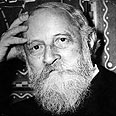
German Jewish culture hits Web
Thousands of rare writings by Jewish intellectuals from Germany to be available online
The rare collections, which include writings from the past 1,700 years, are now located in the basement of the National Library at Givat Ram, Jerusalem. They are only accessible to those who visit the place, and some can only be reviewed by researchers. A German researcher interested in reviewing them must get on a plane and fly to Israel.
As part of the project, all the archives of Jewish intellectuals of German origin who immigrated to Israel in the 20th century which are stored in 500 boxes in the National Library, will be posted on the Web.
They include the writings of Martin Buber, Walter Benjamin, Gerhard Gershom Scholem and Adolf Abraham Fraenkel.
The work uploaded to the Internet includes Martin Buber's original manuscript "I-You", which has notes in his handwriting on the side, the suicide note of Jewish Austrian author Stefan Zweig, who killed himself together with his wife, as well as a letter from famous writer Thomas Mann to one of the Jewish German intellectuals who immigrated to the Land of Israel.
Some 250 rare writing from the Middle Ages, which were written in Hebrew and used by the thriving Jewish communities in different cities, will be available online as well. One of the writings is the Worms prayer book, which was written in 1272 and used for centuries at the synagogue in Worms, Germany, before it was destroyed by the Nazis on Kristallnacht, in November 1938. The prayer book survived the destruction, was hidden, and transferred to Israel in 1957.
Rare musical scores
The National Library plans to digitize the archives of the Jewish communities in Berlin, Frankfurt and Hamburg, which are currently stored in 800 boxes. Some 6,000 books and hundreds of newspapers and magazines printed in German or Yiddish in Hebrew letters will also be posted on the Web.
The archive also includes rare musical segments of Jewish-German musicians who immigrated to Israel, including musical scores which have never been played in public.
The project costs some NIS 10 million (about $3 million) and was initiated by Cabinet Secretary Zvi Hauser.
"The proposal to cooperate with the German government is an example of the warm relationship between the countries, as well as the systematic effort taking place in Israel today at the prime minister's instruction to preserve our cultural assets and guarantee that both we and the next generations will be able to enjoy them," said Hauser.
"This wide-scale activity which includes cooperation with a growing number of organizations in Israel and abroad, including international collaborations," he added.
- Follow Ynetnews on Facebook










